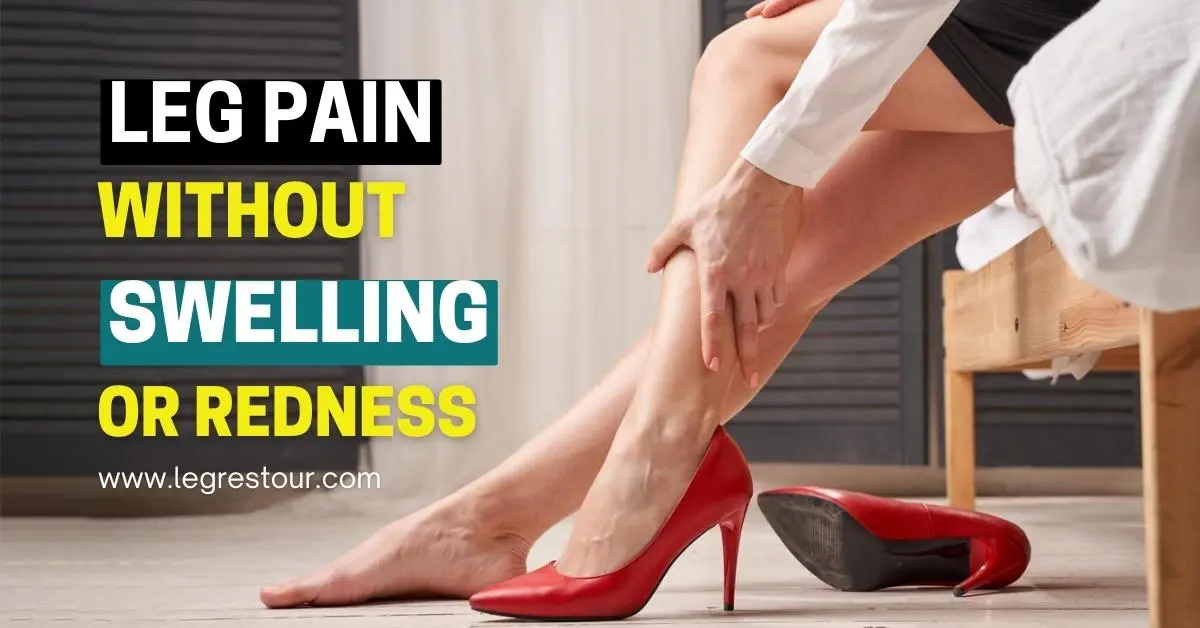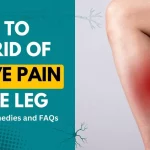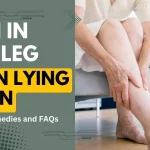Leg pain is a common complaint that can have many different causes. Often, leg pain is accompanied by visible signs of injury or inflammation, like swelling, redness, or bruising. However, sometimes leg pain occurs without these obvious symptoms, which can make it harder to determine the cause.
Some potential causes of leg pain without swelling or redness include:
Muscle strains and sprains – Overuse or injuries of the muscles and tendons can cause pain without visible swelling. Common examples are hamstring strains, calf strains, and quad strains.
Pinched nerves
Compression of nerves in the lower back, hips or legs may cause radiating leg pain. A herniated disc pressing on a nerve root is a common cause.
Arthritis
Osteoarthritis of the knee or hip can lead to stiff, achy leg pain. Inflammatory types like rheumatoid arthritis can also cause leg discomfort.
Poor circulation
Conditions that restrict blood flow to the legs like peripheral artery disease can cause cramping or aching pain in the calves when walking.
Restless leg syndrome
This neurological disorder causes uncomfortable sensations and an urge to move the legs, often worse at night.
Leg cramps
Painful involuntary muscle contractions often affecting the calf muscles at night. Dehydration and mineral deficiencies may play a role.
Referred pain
Pain from other areas like the lower back can radiate down the leg. Sciatica due to a pinched nerve often causes referred leg pain.
Diabetic neuropathy
Nerve damage in diabetics can lead to numbness, tingling, burning or sharp pains in the legs and feet.
Bone fractures
Stress fractures, small hairline cracks in the bone, may cause pain before they are visible on x-ray.
Shin splints
Overuse injury to the shin bones that causes pain with activity. Common in runners.
Nerve entrapment
Compression of superficial sensory nerves like meralgia paresthetica (lateral thigh) and tarsal tunnel syndrome (ankle) can cause leg pain.
The diagnosis can be challenging without obvious signs of inflammation. Your doctor will perform a physical exam checking for areas of tenderness and assessing nerve function. You may need imaging tests like x-rays, MRI scans or CT scans to identify issues with bones, muscles, nerves or blood vessels. Blood tests can look for arthritis and check for nutritional deficiencies linked to cramps and neuropathy.
Home Remedies for Leg Pain Without Swelling
While the underlying cause dictates the proper treatment, there are some general home remedies that may provide relief for nonspecific leg pain without swelling:
- Rest and avoid activities that exacerbate the pain. Take a break from high impact exercises and intense physical labor.
- Apply ice packs to painful areas for 15-20 minutes several times per day to reduce muscle soreness and nerve irritation. Use cushioning material.
- Compression wraps or stockings can provide support and reduce symptoms of poor circulation or restless legs.
- Elevate your legs when possible to promote circulation and fluid drainage.
- Over-the-counter pain medications like acetaminophen, ibuprofen, or naproxen can help ease discomfort.
- Gently massage and stretch tight, sore muscles. Focus on the calves, hamstrings, quadriceps and hip flexors.
- Try an OTC muscle cream containing menthol or capsaicin to relieve muscle and joint aches.
- Improve circulation through light physical activity like walking, leg lifts, and calf raises when tolerated. Avoid sudden jarring movements.
- Drink plenty of water, especially with nighttime leg cramps. Electrolyte drinks can replenish losses from heavy sweating.
- Reduce caffeine, alcohol, and sugary drinks, which can exacerbate restless legs.
- Soak your legs in an Epsom salt bath to boost magnesium absorption and relax muscles.
- Try supplements like magnesium, potassium, vitamin D, or alpha-lipoic acid which may reduce leg cramps and neuropathy. Check with your doctor first.
- Use heating pads and warm baths for chronic neuropathy or nerve-related leg pain. Avoid applying heat to acute injuries.
- Consider physical therapy exercises tailored to your condition for strengthening and pain relief.
- Ensure proper foot support and cushioning with orthotics, shoes inserts or supportive footwear.
Get further evaluation from your doctor if home remedies do not provide lasting relief. Proper treatment depends on an accurate diagnosis but may include prescription medications, injections, surgery, or lifestyle changes. Seek immediate medical care for leg pain accompanied by severe swelling, redness, numbness or loss of function which could indicate a serious health issue requiring urgent intervention.
Frequently Asked Questions About Leg Pain Without Swelling:
Q: What does leg pain without swelling mean?
A: Leg pain without visible swelling, redness or bruising typically indicates problems with bones, muscles, nerves or circulation rather than an acute inflamed injury or infection. Lack of obvious inflammation can make the cause harder to diagnose.
Q: When should you worry about leg pain without swelling?
A: See your doctor promptly for evaluation of prolonged, persistent, recurrent or worsening leg pain without a known cause. Severe or debilitating pain that interferes with sleep and activities warrants urgent medical care to determine the underlying problem.
Q: What helps ease leg pain overnight without swelling?
A: Gentle stretches before bedtime, elevating your legs, applying ice or heat, massaging sore muscles, staying hydrated, and taking over-the-counter pain medication can help manage nighttime leg discomfort without swelling. Look for potential leg cramp triggers like dehydration or mineral deficiencies.
Q: Can pinched nerves in the back cause leg pain without swelling?
A: Yes, a pinched nerve in the spine, also called a radiculopathy, frequently causes radiating leg pain without obvious swelling. Typical culprits are herniated discs applying pressure to nerve roots. Diagnostic imaging can confirm nerve compression.
Q: What vitamin deficiency causes leg pain without swelling?
A: Vitamin D and B complex deficiencies have been linked to chronic nonspecific muscle aches and pain. Magnesium deficiency may contribute to nighttime leg cramps. Diabetic neuropathy can cause leg pain from vitamin B12 deficiency. Blood tests can reveal any nutritional shortfalls.
Q: Can blood clots cause leg pain without swelling?
A: While blood clots often cause leg swelling, it is possible to have a deep vein thrombosis causing leg pain without visible swelling, especially in the calf area. This warrants urgent medical evaluation, as blood clots can be life-threatening if untreated.
Q: When to see a doctor for leg pain without swelling or lumps?
A: See your doctor if leg pain persists over 2 weeks, severely limits function, or is worsening. Seek emergency care for sudden, severe leg pain or pain accompanied by numbness, loss of function, injury, falls or trauma which could indicate a fracture or neurological issue.
In summary, leg pain without obvious swelling has many potential causes that require a full medical workup for accurate diagnosis. Home remedies combined with medical treatment of underlying conditions can help manage this troublesome symptom and restore mobility.



